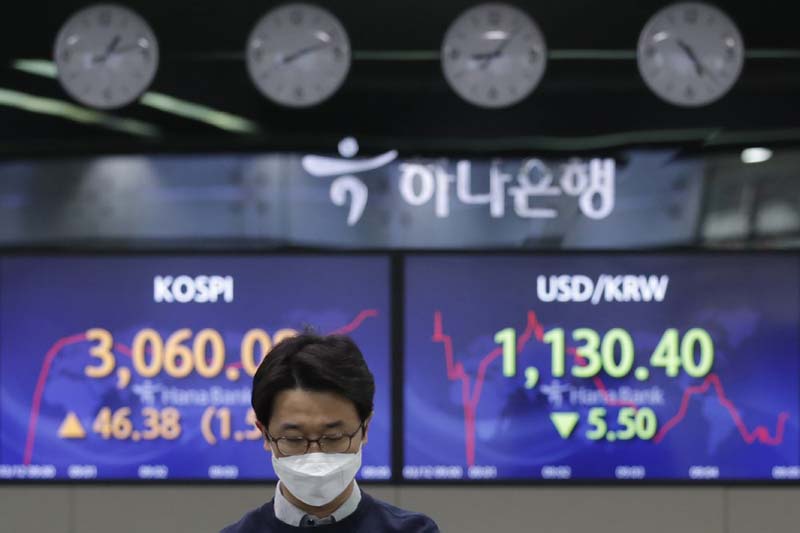

Stocks were mixed in Asia on Friday after broad gains lifted several major indexes to all-time highs on Wall Street.
Tokyo’s benchmark rose 1% while Chinese indexes slipped as investors cashed in on recent surges in share prices. Oil prices fell slightly and the yield on the US 10-year Treasury was steady at 1.54%.
US markets surged after President Joe Biden signed into law a sweeping pandemic relief package that would provide $1,400 checks for most Americans and direct billions of dollars to schools, state and local governments, and businesses affected by pandemic-related shutdowns, which began a year ago.
That and progress in vaccinations against Covid-19 have helped settle some of the uncertainty that has roiled markets in recent weeks.
The Nikkei 225 added 277 points to 29,488.74 while South Korea’s Kospi climbed 0.9% to 3,041.31. In Australia, the S&P/ASX 200 added 0.8% to 6,764.90. Hong Kong’s Hang Seng lost 0.5% to 29,238.89 and the Shanghai Composite index declined 0.3% to 3,428.15.
Shares rose in Jakarta but fell in Singapore and Malaysia. Taiwan was unchanged.
On Thursday, the S&P 500, the Dow Jones Industrial Average and a measure of small-company stocks all closed at record levels as a recent stretch of volatile trading in the bond market continued to ease, keeping investors in a buying mood.
The S&P 500 added 1% to 3,939.34. The Dow added 0.6% to 32,485.59, its second all-time high in a row.
The Nasdaq composite gained 2.5% to 13,398.67. The tech-heavy index, which earlier in the week skidded more than 10% below its February peak, has regained some ground, but remains 4.9% below that all-time high.
Traders also bid up shares in smaller stocks, pushing the Russell 2000 index up 2.3% to 2,338.54.
Technology stocks, which have been hurt this year by rising bond yields, led the market higher, aided by solid gains in communications services companies and those that rely on consumer spending. Banks, utilities and household goods companies fell.
The stimulus coupled with ultra-low interest rates are expected to help charge growth as industries bounce back from pandemic downturns, analysts say.
“We’re entering this environment where growth is going to be higher than expected,” said Charlie Ripley, senior investment strategist for Allianz Investment Management. “With higher growth you get higher interest rates.”
The biggest IPO in years rolled out Thursday on the New York Stock Exchange where Coupang, the South Korean equivalent of Amazon in the US, or Alibaba in China, began trading under the ticker ‘CPNG’. The stock soared 40.7%. It’s actually the largest initial public offering from an Asian company since Alibaba went public about seven years ago and the biggest in the US since Uber’s more than $8 billion IPO in 2019.
General Electric fell 7.4% for the biggest slide in the S&P 500 for the second straight day. The industrial titan announced it would wind down its GE Capital business and merge its jet leasing business with Ireland’s AerCap. GE is in the midst of a multi-year turnaround plan, but investors have been concerned GE has been selling off too many of its more profitable assets.
The price of US crude oil rose 2.5% and lifted energy company stocks. Occidental Petroleum jumped 5.5% and Hess rose 3.2%.
On Friday, benchmark US crude slipped 19 cents to $65.83 per barrel in electronic trading on the New York Mercantile Exchange. Brent crude, the international standard for pricing, lost 12 cents to $69.52 per barrel.
The US dollar cost 108.71 Japanese yen, up from 108.53 yen late Thursday. The euro fell to $1.1962 from $1.1983.